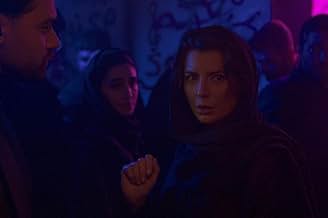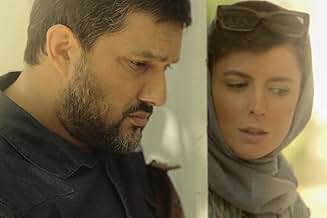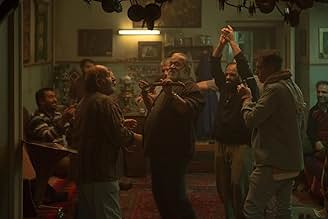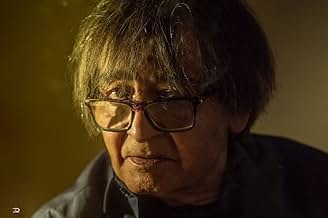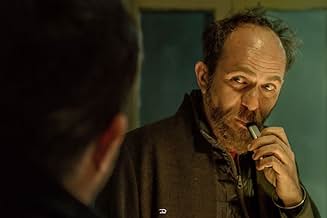Pir Pesar
- 2024
- 3h 12m
ÉVALUATION IMDb
8,0/10
1,5 k
MA NOTE
Ajouter une intrigue dans votre langueTwo Iranian brothers live with their abusive father. When he rents to a young woman planning to marry her, her attraction to the older son creates tension in their already fractured family.Two Iranian brothers live with their abusive father. When he rents to a young woman planning to marry her, her attraction to the older son creates tension in their already fractured family.Two Iranian brothers live with their abusive father. When he rents to a young woman planning to marry her, her attraction to the older son creates tension in their already fractured family.
- Prix
- 3 victoires et 1 nomination au total
Avis en vedette
The film was shocking and at the same time fascinating, a 3-hour film that no one left the theater during the screening! The story progressed well for the first hour, and when it reached the second hour, it became a little boring. I think this film could have been much more interesting at 2 and a half hours. The last 30 minutes of the film are when the story reaches its darkest point, and several horrible secrets are revealed and those shocking events occur that are like a bucket of ice water being poured on the viewer. Despite being still in shock, the viewer looks at the last frame, which is full of longing, tragedy, and blood, and that music and the dirty, messy house, which now has negative energy lurking in every corner, and the film ends.
Well, where do I even begin? I just left the theater a few hours ago, and I'm still in shock. The movie starts off intriguingly, skillfully introducing each character. You immediately get a strong sense of everyone's personality and background, which makes it easy to connect with them on a deeper level.
The direction was stunning, and the cinematography was breathtaking. But what truly stood out was the acting. The entire cast-Qolam (Hassan Pourshirazi), Ali (Hamed Behdad), Reza (Mohammad Valizadegan), and Raana (Leila Hatami)-delivered performances that were nothing short of exceptional. Hassan Pourshirazi's portrayal of Qolam was particularly profound; it felt like the character and actor were one and the same. His performance ranks among the most realistic and deeply moving in recent Iranian cinema.
I've noticed some negative reviews, which I believe stem from the film challenging deeply rooted taboos in Iranian society. This film bravely confronts a taboo rarely addressed in Iranian cinema: the unquestioned respect for parents, especially fathers, regardless of their behavior. I'm not saying fathers shouldn't be respected, but only if they truly fulfill the role of a father-that is, someone a child can rely on and trust.
In many countries, organizations exist to support children with abusive parents or women facing abuse from older men-another taboo topic this film highlights. But in Iran, a father can legally inflict severe harm on his children, sometimes even lethal, with minimal consequences. This film powerfully depicts how a father's destructive behavior can ruin his children's lives, leaving them powerless to stand up against him.
Some critics argue that if this movie were made in Hollywood, it wouldn't have the same impact. But films must be judged within the cultural and social context in which they were made. It's telling that the film was completed four years ago but only released recently-no doubt due to government censorship cutting many scenes. Iranian filmmakers don't enjoy the creative freedom their Western counterparts do.
Taking all this into account, this film is a masterpiece that held me captive from start to finish. The last 30 minutes had me on the edge of my seat, and when the credits rolled, I was so overwhelmed I couldn't move for several minutes. This is a must-watch film that sheds light on how children can become victims of their parents, how young women can suffer at the hands of older men, and how society itself can fail its youth.
A truly brilliant film with outstanding performances.
The direction was stunning, and the cinematography was breathtaking. But what truly stood out was the acting. The entire cast-Qolam (Hassan Pourshirazi), Ali (Hamed Behdad), Reza (Mohammad Valizadegan), and Raana (Leila Hatami)-delivered performances that were nothing short of exceptional. Hassan Pourshirazi's portrayal of Qolam was particularly profound; it felt like the character and actor were one and the same. His performance ranks among the most realistic and deeply moving in recent Iranian cinema.
I've noticed some negative reviews, which I believe stem from the film challenging deeply rooted taboos in Iranian society. This film bravely confronts a taboo rarely addressed in Iranian cinema: the unquestioned respect for parents, especially fathers, regardless of their behavior. I'm not saying fathers shouldn't be respected, but only if they truly fulfill the role of a father-that is, someone a child can rely on and trust.
In many countries, organizations exist to support children with abusive parents or women facing abuse from older men-another taboo topic this film highlights. But in Iran, a father can legally inflict severe harm on his children, sometimes even lethal, with minimal consequences. This film powerfully depicts how a father's destructive behavior can ruin his children's lives, leaving them powerless to stand up against him.
Some critics argue that if this movie were made in Hollywood, it wouldn't have the same impact. But films must be judged within the cultural and social context in which they were made. It's telling that the film was completed four years ago but only released recently-no doubt due to government censorship cutting many scenes. Iranian filmmakers don't enjoy the creative freedom their Western counterparts do.
Taking all this into account, this film is a masterpiece that held me captive from start to finish. The last 30 minutes had me on the edge of my seat, and when the credits rolled, I was so overwhelmed I couldn't move for several minutes. This is a must-watch film that sheds light on how children can become victims of their parents, how young women can suffer at the hands of older men, and how society itself can fail its youth.
A truly brilliant film with outstanding performances.
10AAH8
After "OLD BOY" movie , THE OLD BACHELOR is the second best movie in Asia !!!
This movie is based on the famous book "Shahnameh" by Ferdowsi and I can confidently say that it is one of the most breathtaking movies of 2025 that you can watch.
In my opinion this movie should definitely be in the Oscars and I think like in 2019 when "Parasite" won all the awards, this can happen again for this movie.
This movie is based on the famous book "Shahnameh" by Ferdowsi and I can confidently say that it is one of the most breathtaking movies of 2025 that you can watch.
In my opinion this movie should definitely be in the Oscars and I think like in 2019 when "Parasite" won all the awards, this can happen again for this movie.
The Old Bachelor is one of those rare films that dares to be honest. It doesn't shout or preach-it simply presents. The relationship that slowly forms between the characters played by Leila Hatami and Hamed Behdad may feel natural, even ordinary, in real life, but within the narrow confines of Iranian cinema, it feels fresh, bold, and quietly subversive.
Leila Hatami delivers a subtle, layered performance-once again showing how a female character can be portrayed with depth and nuance, without melodrama or overstatement. She plays a tired, complex, emotionally wounded woman whose silences carry meaning and weight.
Opposite her, Hamed Behdad brings a restless energy to the screen. His character, impulsive and raw, becomes the perfect counterbalance to Hatami's restraint. What emerges between them is not a typical love story, but a human connection that grows out of shared loneliness and mutual understanding-a kind of emotional recognition more than romance.
Meanwhile, Hassan Pourshirazi grounds the film with a deeply lived-in performance. He doesn't so much play the role as inhabit it. His quiet presence and expressive stillness lend the story an earthy authenticity.
The Old Bachelor tells a story that, in the real world, might pass unnoticed. But in Iranian cinema-often limited by censorship and symbolic overcomplication-this kind of direct, emotionally honest narrative feels both unusual and necessary. That contrast is what makes the film so compelling.
Leila Hatami delivers a subtle, layered performance-once again showing how a female character can be portrayed with depth and nuance, without melodrama or overstatement. She plays a tired, complex, emotionally wounded woman whose silences carry meaning and weight.
Opposite her, Hamed Behdad brings a restless energy to the screen. His character, impulsive and raw, becomes the perfect counterbalance to Hatami's restraint. What emerges between them is not a typical love story, but a human connection that grows out of shared loneliness and mutual understanding-a kind of emotional recognition more than romance.
Meanwhile, Hassan Pourshirazi grounds the film with a deeply lived-in performance. He doesn't so much play the role as inhabit it. His quiet presence and expressive stillness lend the story an earthy authenticity.
The Old Bachelor tells a story that, in the real world, might pass unnoticed. But in Iranian cinema-often limited by censorship and symbolic overcomplication-this kind of direct, emotionally honest narrative feels both unusual and necessary. That contrast is what makes the film so compelling.
The Old Bachelor," directed by Oktay Barahani, was for me more than just a typical drama. With Hassan Pourshirazi's outstanding performance as Gholam Bastani, the film skillfully portrays the archetype of the "Puer Aeternus" or "Eternal Youth." This character, despite his age, remains emotionally stunted, refusing to embrace the responsibilities of adulthood.
This interpretation is reinforced by Gholam's own pivotal dialogue: "A man whose life has no rules or order, even if he grows old, will remain an old boy and never truly grow up!" Furthermore, one can observe echoes of "Dionysus," the god of ecstasy and liberation, within Gholam Bastani, which perfectly complements the "Eternal Youth" aspect of his character. This is a profound and thought-provoking film that delves into the psychological layers of humanity.
This interpretation is reinforced by Gholam's own pivotal dialogue: "A man whose life has no rules or order, even if he grows old, will remain an old boy and never truly grow up!" Furthermore, one can observe echoes of "Dionysus," the god of ecstasy and liberation, within Gholam Bastani, which perfectly complements the "Eternal Youth" aspect of his character. This is a profound and thought-provoking film that delves into the psychological layers of humanity.
Meilleurs choix
Connectez-vous pour évaluer et surveiller les recommandations personnalisées
Détails
- Date de sortie
- Pays d’origine
- Langue
- Aussi connu sous le nom de
- The Old Bachelor
- société de production
- Consultez plus de crédits d'entreprise sur IMDbPro
- Durée
- 3h 12m(192 min)
- Couleur
Contribuer à cette page
Suggérer une modification ou ajouter du contenu manquant

![Regarder Trailer [OV]](https://m.media-amazon.com/images/M/MV5BNDAyMzdjYmEtZDY2ZC00ODdmLTkyNjAtNDAxZGFmMmJiZmZjXkEyXkFqcGdeQXRyYW5zY29kZS13b3JrZmxvdw@@._V1_QL75_UX500_CR0)
